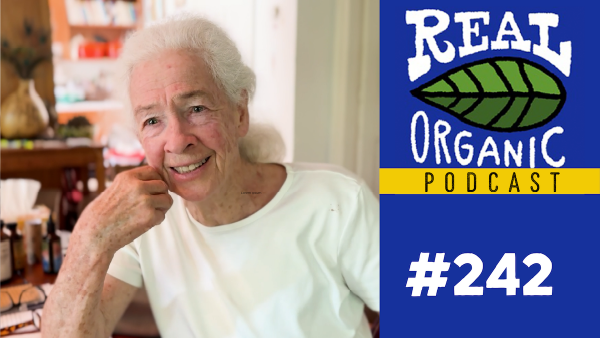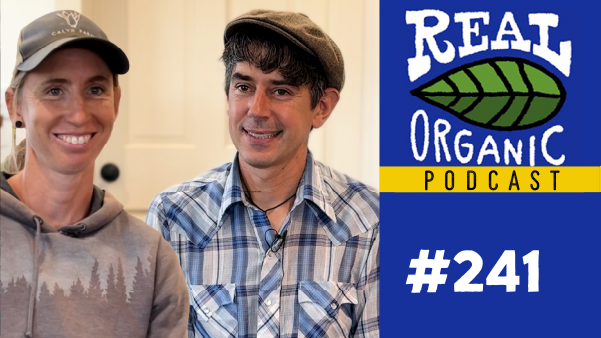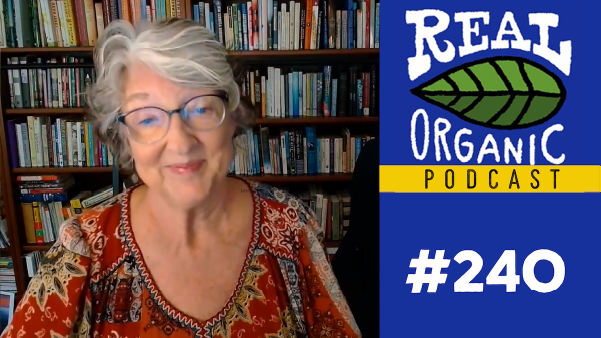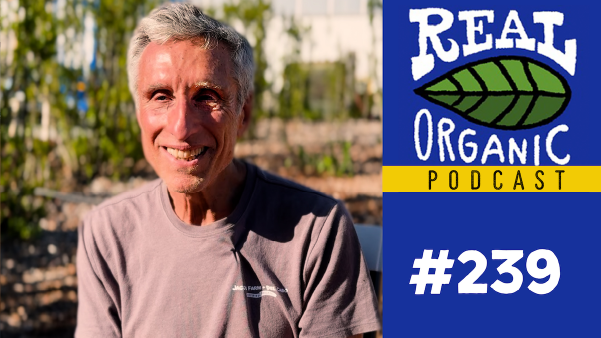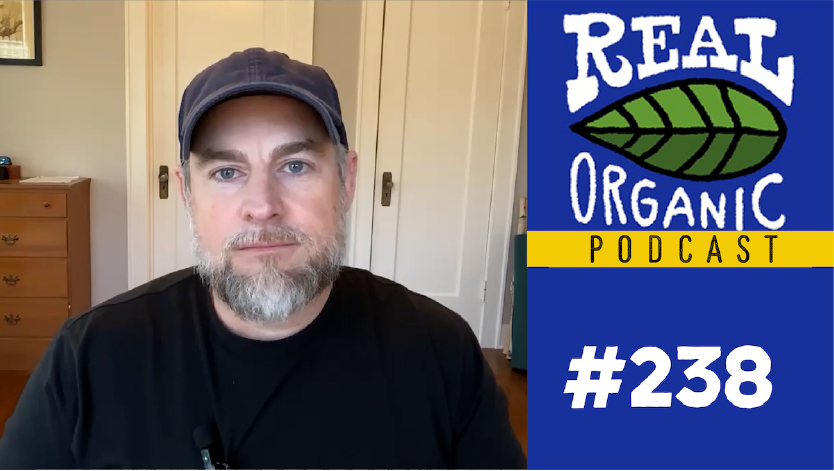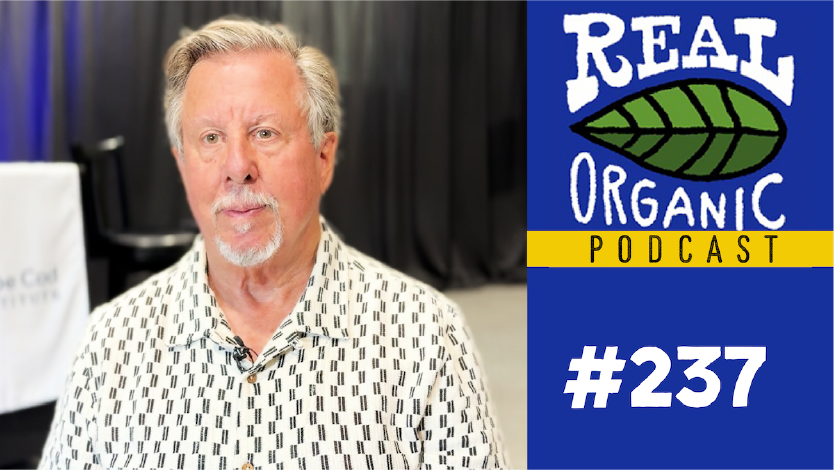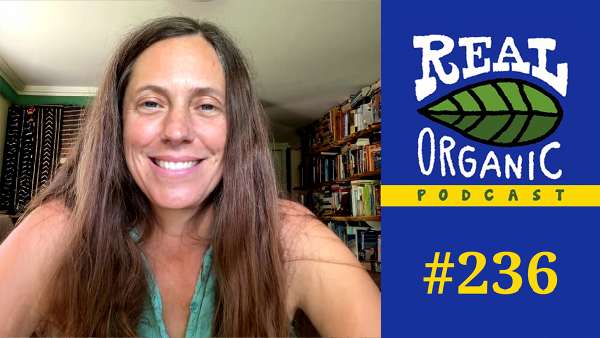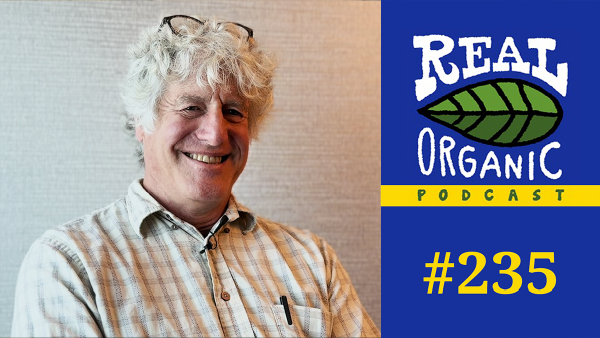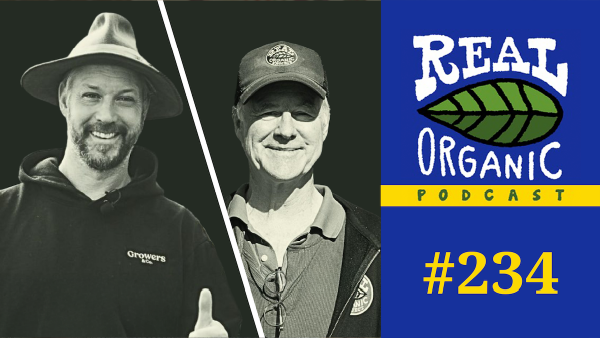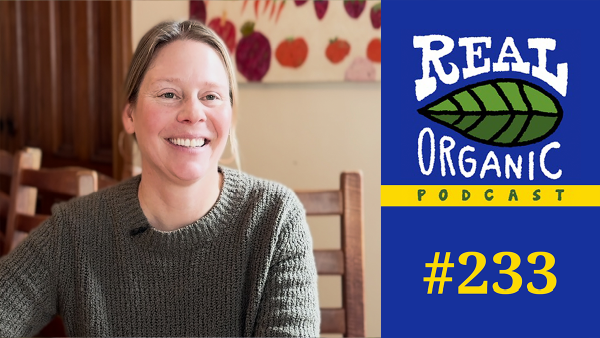Episode #192
John Bobbe: Aiding And Abetting Organic Grain Fraud
Welcome! You can subscribe and download episodes of our show through your favorite podcast app.
You can also subscribe to receive the video version of each episode on our YouTube channel.
Our John Bobbe interview has been edited and condensed for clarity.
Dave Chapman interviews John Bobbe at the Marbleseed Conference, in February of 2024:
Dave Chapman 0:00
Welcome to The Real Organic Podcast. talking today with John Bobbe. John, I’m gonna let you do most of the explaining about who you are you You in my mind are one of the people who really brought to the public news of a lot of the big challenges and especially the challenges around grain for organic fraud and and the erosion of meaning in the National Organic Program. So how did you get to be in that position?
John Bobbe 0:39
In 2000, I was asked to become the Executive Director of the Organic Farmers Agency for Relationship Marketing. OFARM is the acronym that most people know by it. And it was to bring people together over a common problem which Prease long preceded the President’s set of problems, and that was low organic grain prices. We brought them together in Ames, Iowa, on two separate meetings. And then they got the idea about forming a federation of cooperatives based on an actual conventional cooperative, of Federation of cooperatives that marketed milk into the city of Chicago. And from that old farm grew into more and more into marketing, organic grain. And as time went on, it was about 2012. OFARM was formed in about 2000, about 2012. The marketers of the various cooperatives, which communicate with each other on a conference on conference calls, began to notice pressure on organic grain prices downward. And it would be about when was this about 2012 2012. And we didn’t know what the problem was. Yeah. And then one of the coops had hired a trucker to transport its members grain. And the trucker said, I’m tied up for a couple of days. And we, the marketer got to asking why. And here it was to unload a ship load of grain in the port, and Gary, Indiana. And so the trucker was able to get us pictures. And that’s the first evidence that we had, that there was potentially foreign organic grain coming into the United States. Before that, we just heard rumors about it. Well, then that sort of gave us the clue to start looking. What it was, was a bunch of farmers and myself, my background is as an ag economist. And I just, we started looking at, we didn’t know what to look for. But we thought chips might be a good place to start looking. And as a consequence, we started over the next couple of years to find chips of potentially fraudulent grain. And as we went along with this, the reputation got out within the industry, and the organic industry, some of it good and some of it not so good. But we started to get people that were knowledgeable that were just, it was just rumors before that, that would give us tips. And the first time that we actually had a ship that we turned around was in the port of Olympia, Washington. Again, these when they started this out, they started bringing the grain in, not into mainline ports, but rather obscure out of the way ports. The Great Lakes does not make a transportation wise a logical place to bring grain in both of the coasts. Do make logic or the Gulf of Mexico.
Dave Chapman 4:33
Don, let me interrupt you for a second just to get a little context here. So is it unusual? Let’s see it just about conventional. Is it unusual for the US to be importing grain?
John Bobbe 4:49
For the most part, yes. Export, we export. Some of that’s been jumbled up over the last couple of years with the trade war with China and some of that the problem initiates or originates in the fact that the organic industry grew so fast and the segments that grew, were the ones that required organic grain, soybean, especially soybeans, and corn. And as a result, the demand for organic grain and of corn and soybeans did not keep up with the growth of primarily on the livestock side that included organic dairy laying organic laying hens, and organic broilers. So I
Dave Chapman 5:40
got to ask, and I know we got a lot of conversations here. But I’m really curious when you say that demand was growing rapidly. So for organic dairy, that you would think that the demand would be for more pastures.
John Bobbe 5:56
This was before the pasture rule. And the pasture rule is just finally gotten gotten gone into effect. But it was before where the pasture rule could be circumvented. And you had, that’s where you ended up with these large organic cables, if you will, in the organic and dairy. And in chicken, what they did is they simply took the corporate industrialized model with the same many of the same features as the contract broiler industry. You put up a house, we’ll finance it for you, you provide the labor, and we’ll ensure that you got the feed that we want fed and all this sort of thing and the demand, it was driven by consumer demand, in a couple of ways. Dairy was driven by especially young mothers with kids, that they felt that organic, primarily due to Organic Valley, among others, was a more wholesome product to be feeding their children. The second thing down the list was vegetables. And then the third thing would be the meat, the chicken. And that’s the one that’s been really driving it is the demand. And people can relate to the $5 Costco chicken, while Costco is now into organic chicken. And they have followed the same model as their conventional counterparts, their conventional side, and the conventional integrators, which have a horrible reputation and how they treat their growers and the labor that’s involved in it. But that started stripping away, so to the point where we only raise about 25 or 30% of the needs of our organic soybeans, domestically. And corn, it’s probably about 60%
Dave Chapman 8:15
that we raise that we realize we’re importing 40% of this certified organic corn,
John Bobbe 8:21
well suppose a certified. And what we began to look at when we started tracing is there was a whole educate learning curve on our part, a bunch of farmers and myself about we’d never ever gotten into there ever thought about tracking ships. Well, it was fortunate that in my family, I have a cousin that was a captain of a merchant marine ship. And so what I was able to do there now, he didn’t deal with grain in any way. But I was able to talk to him about what goes on on a ship. And who controls what goes on from the point where the ship is loaded all the way to where it’s unloaded. And all of the things that go with it. I mean, you can imagine organic require certain procedures when a grain truck shows up on a farm, or it could have been hauling grain previously, it’s supposed to be commercially washed. That farmer is supposed to get up in there and walk that trailer to be sure that the covers on that trailer don’t have dust to be sure that the rails on the sides of the truck and everything don’t have contamination from genetic, like growing crops or even non GMO crops. When it got to ships, the question was Who inspects the ship? And can you imagine a ship that is hauled laying flat 10s of 1000s of bushels and what it’s like, how do they go in? And do they clean that? Do they, in some cases, they would have to physically go in there with workers with steam and clean the ship, in theory before it would be eligible to pass, certify all certified grain. And so solos are all of the questions we started asking and going back when that ship arrived, we informed the we talked with Myles McAvoy, who was the head of the National Organic Program about what should we do and he said, Tell us and they intercepted that ship with Customs and Border Patrol. And they turned the ship around. This is the one in Olympia, Washington Olympia Washington. The most notable one was a couple more notable ones was a ship, then the Peter were risque from the Washington Post got involved. And it happened to be right here where we are in La Crosse, Wisconsin doing this, that a mutual friend, friend of myself and a Peters took us out to dinner that site started the conversation about potentially he’s an investor, he was an investigative reporter for The Washington Post and started the conversation about how to possibly investigate whether there was fraud or not. And so I and a couple others worked with Peter on this. And there was at that point, we knew that a lot of the grain and this was before the disturbance in the war with Russia and the Ukraine, a lot of the grain was coming out of the Black Sea region, especially the Ukraine. Now, I have been to the Ukraine, courtesy of a European group that was concerned about organic integrity, and the conference was held in Odessa, about organic fraud and and Ukraine. A couple of things about it. It’s a huge, huge country. And if you split the country in half east to west, south of that they don’t grow corn, they only have enough moisture, where they can grow lentils and wheat. But north of that they can but the logical market for that would be into Europe into the European Union. So the question is, why was that corn coming to ports in the Black Sea, then it was being barged across the Black Sea to Turkey. Now the key to Turkey in this whole thing is that Turkey is a free trade zone where there’s basically no rules. So they were loading it on a ship. And Turkey was shipping it into the United States. Peter were risky was able to get the documents and I don’t know how because that’s obviously his privilege as an investigative reporter. But when the ship left Turkey, the grain was conventional. One of the paperwork and the ship arrived in the United States to be unloaded. It was organic. And in the process, they had found that also the grain was fumigated which to get rid of bugs, which is a total violation of organic rules. And that happens. I’m saying about in the late teens, and it was just before that, that the USDA was saying everything is okay. And about five days later, Peter whiskys report was made news in the Washington Post and that whole totally blew up in the USPS face about about the ships. Subsequently, we had one in San Francisco that they were trucking it into Stockton, California, which is interior and being on loaded for organic dairy and California. And we had some sources out there that we actually had people that could get very, very close, I won’t reveal how we did it to the ship itself. And we were able to get that ship a Customs and Border troll boarded that ship. And they blocked it from entering the United States. And as a result, it shad sat for about five weeks out in San Francisco Bay, waiting. And there was a lawsuit filed over at the Department of Justice got involved in it. And I always remember that we had the I was at the National Organic Standards Board meeting in Tucson. And I went to Jenny Tucker, the head of the National Organic Program, and I said, Jenny, we just got word that simply said to me, well, then the program is doing what it’s supposed to when in fact, they were scared to death of getting involved in the lawsuit, the Department of Justice stepped in. And things got they got countersued and as a result, the ship left. Now, what we tried to do in that process is the ship left, we wanted to see that it did not go to another US port as a result that went all the way back to the Panama through the Panama Canal. And it headed to the United Kingdom. And we had established connections with organic farmer group in the United Kingdom that was having the same problem of fraudulent fraudulent grain coming into the UK, the UK does not raise corn and soybeans. So they’re totally dependent on this for their, especially their feed industry for their dairy and poultry and so on. And so we tried to get the USDA NOP to share the information. So our counterparts in the UK could make it known to their authorities. And the only way that the NOP would do it is well, they have to ask us for the information. The ship got into the UK, and it got unloaded. And that was in my opinion, excuse making on the part of the National Organic Program, they could have readily called him up and said we’ve got this questionable ship coming your way. Ask us for the information. Nothing was done. After that there was another vessel. And where we got to identify these was a port of origin in the Black Sea region or Turkey was automatically suspect. It came it was a ship that was coming into a port in North Carolina. And the result was we alerted the National Organic Program about it. And
John Bobbe 18:02
that it was suspect. And we some contacts got involved with the North Carolina Department of Agriculture, which was willing to board the ship and do the inspections check the paperwork and stuff, along with Customs and Border Patrol. And the USDA said, No, you don’t go near that ship. The ship was unloaded. It got into the green channel. And three days later they revoked the certification. When in fact they were warned in advance. So these are some of the examples. I think at all we ended up turning in about 13 chips, which cost the industry about over $100 million that we kept out of the supply chain or tried to keep out of the supply chain at the same time protecting our domestic organic grain and soybean farmers
Dave Chapman 19:00
and protecting our organic customers or consumers who are paying because they think it really is organic. And
John Bobbe 19:08
that’s part of the problem with organic grains is that the consumer unless it’s flour, or a bakery product, they don’t come in direct contact with something of that of the rest of the organic grain sector. They pick up that chicken and they assume it was raised with organic soy soybeans and corn or dairy cattle and in the case of dairy one of the issues has has always been with dairy because I grew up on a dairy farm. farmers want to call up the local mill and say that they’re accustomed to doing business with that sir organic grain supplier and say I’m out of grain bring me my usual mixture of grain. And what really should have been happening is the farmer should have been asking for the paperwork on where the feed mill was getting its organic grain from and whether it was legitimate or not. And that is a failure on the part of the organic system, but to some degree falls back on organic farmers, as well. And we’ve even had right here and lacrosse, we’ve had local feed mill that’s well known and organic, bring in barge loads of questionable grain. Now, they’d say it was perfectly, perfectly legitimate. Now another issue that goes along with this is for a long time, one of the sources also was not just the Ukraine, but and Russia, what what you ended up with with this whole scenario is that you essentially had the Turkish mafia, the Russian mafia, the Ukrainian mafia, and what they would do in Ukraine and Russia, they would go into this small farmer or group of farmers and say, sell us your grain, or we’ll make sure you don’t have a market. So what is the farmer do he doesn’t know where his grain is going? Or what’s going to happen to it, and that it would be taken to Turkey and reloaded. And come here. And when we got to looking at where is this grain produced, Turkey does not produce even enough grain to meet its domestic needs. As far as corn we found out from the USDA, his own Foreign Agricultural Service numbers about about it. And another time there was a ship and they got creative. They were going to bring it in by transloading it through Romania, which is part of the European Union, no questions asked. But it actually originated, I think, in the Czech Republic, when you looked at the Foreign Agricultural Statistics, that shipload was more than the entire grain production in that entire country. And yet it was being loaded and brought in here, and we alerted the USDA? Well, there’s not really enough evidence for us to since it’s coming from an EU country to go and inspect it. And so the other problem with organic grain is that there is no capability on the part of the National Organic Program to stop shipment. It’s a very controversial issue. Because you’ve got companies that may legitimately be bringing things in, that may be perfectly good. And what happens is, you’re going to potentially going to cost money. So that’s the industry side of this thing. But the USDA has no mechanism, once something has been identified as fraud, to go back into the market channel and take it off the market. The other problem we’ve got that we’re facing today, is Canada. Now Canada’s not the perpetrator that they are. There’s a lot of legitimate organic grain farmers in Canada, that’s not the issue. The issue is trade. And that is that similar to what auto parts are, we’ve got a big controversy about how many components in a car should be allow a car to be stated as Made in the USA. And does that include the parts that are made in Canada for a lot of our common Chevrolet, Ford, and and so on? The issue is that if a grain comes into Canada, and is unloaded in Canada, and then comes across the Canadian border into the US, is there a way of tracing that to whether its origin could have been in some Eastern European country because it would come across the border as being a Canadian product. And there was a major issue with this on the conventional side in meat in Montana, a number of years ago where the USDA did the Meat Inspection Service did get on the ball because there was product coming in from Canada that was being stamped as USA created. And that didn’t necessarily qualify or it so it’s it happens on the conventional side some but it’s been happening in the organic. The other problem is not just organic grain and that is what comes our from our southern border in Mexico and that is vegetables and fruits. And there have been some bad cases of wastewater growing cantaloupes and stuff like that, that made people sick in this country that was supposedly organic and violates the organic production rules. And there’s two things that relate to that. One is some of the organic production is flown in on planes. So which airports are going to land on? How do you keep track of that, and trace the eligibility of it. The second thing is in coming from Mexico, is some of that along our southern borders, may be some farmer in Mexico with a simple straight truck that he’s going to call on van truck that he hauls across the border to customers. And he may be perfectly legitimate. But there may be some things they’re hot haulers, USDA going to get control of that. I mean that that’s even a bigger issue entity called NerdWallet. So a number of years ago did a study about that, and really raised the flags about the organic vegetables that are coming in to the US from Mexico and poor inspection rates to ensure both the health and the integrity of organic. The
Dave Chapman 26:16
last figure that was quoted to me was 60% of our produce is imported. Only 40% of the organic produce is grown in this country, which helps to start make sense of the fact that organic last I saw was 7% of our food sales, but only 1% of our acreage is certified organic. And you go well wait, how does that work? But But now it starts to make sense that we’ll we’re importing a great deal of it. So this, this just to say, John, it seems like a little bit of a breakdown of the capitalist ideal, which is that, that if we consider the market to be a measuring machine, and it’s saying we want more of something, and because of that the price will go up. And because of that people will move into production, until they out produce the demand. And then it will start to go down to the measuring machines being rigged here, somebody’s got their finger on the scale, because what’s happening is the demand went up and the price went down. So and what you’re suggesting is that $100 million of grain got turned away. That wasn’t really organic. But I’m guessing that a lot of grain did still get through.
John Bobbe 27:34
Yeah, the the reason we were able, for instance, to track in California in Stockton, is at the pet all depends on the port, they have very open records about ships, the name of the ship, the arrival date, what its cargo is, and so on. You can get to some of the other ports on the east coast where that information, they don’t make it public very easily, publicly available. The other side to that is that you have organic companies that are huge, and that’s another issue is the concentration. They’re buying up what were once very familiar names and organic. But behind it as a great big corporation. You see the likes of Cargill, getting into organic grain now, but Cargill has a whole host of consumer products. You’ve got General Mills, that’s that’s involved. And some of these companies actually have their own elevators. And there’s a particular large grain or chicken production company on the East Coast, that they have their own elevator facility in the ports. And so the question is, we’re supposed to have inspection by independent inspectors. But where do you break into that supply chain that goes from where it originates all the way through with the transportation right into that company’s facilities? And which way should the inspector look, in some cases to the problem we ran into with the Ukraine and before Russia really became a place not to be was that some of those farms were so far out? That there’s no way inspectors were able to go in the muddy roads and find them? Or you only went to an office and saw the paperwork that whoever wanted you to see and not necessarily everything That should have been seen. And so there’s a whole breakdown here. Supposedly, some of it will be supposedly corrected with the strengthening organic enforcement. But there’s a lot of holes in strengthening organic enforcement, especially when it comes to this whole area of, of imports. And so on. The problem, you’re precisely right about the market, the market should reflect in a capitalistic market send signals about what’s needed in the marketplace, and the imports of organic are sending a signal to farmers that no more production is needed. And we’re dropping your price. Part of that comes because some of these companies are both conventional and organic, and organic, or in conventional farmers have thought, or the industry has thought that farmers are a dime a dozen. And if some of them go out of the business, there always be more that we can pick up that they’ll either be bigger, or maybe a few new entrants. And they’ll always be there, the organic industry being so small is a very, very fragile thing. And it’s very high risk takes five years for a farmer to take the risk to transition his land to be certified organic. And that risk involves in a lot of cases, the high capitalization and the need for borrowed money for farmers, not only established farmers that are thinking of transitioning, but there’s sort of a breaking point there. If a farmer is 60 years old, and it takes five years to transition to organic, he’s not going to do it. I mean, it doesn’t make sense unless he’s got somebody younger, that he’s going to transition the farm to, for the younger person that’s in their mid 20s 30s, even 40s. It’s extremely high risk for them and starting out because they don’t have the experience and the knowledge base unless it’s within a family. And there are availability, as far as lenders, you just don’t go out and find a lender in the agricultural community, that if you walk in there and say, I want to, I want to be an organic farmer, but this is the risks, it’s gonna take me five years to do that. And I might have a potential takeover of weeds and a crop failure in between. Are you willing to go with me for five years to do that? Now there are a few lenders that are knowledgeable about it, and willing to do it, but it’s not the overall situation as far as especially younger farmers needing it and the other thing is somewhat dependent on the conventional side, because they’ve got heavy government subsidies. And at certain times, when times are really good, it creates a land rush. And there’s some outrageous prices being paid even 15 to $25,000 an acre in certain areas, have farmers latching on to additional land simply because they had the money to do it. And that impacts both younger farmers and organic farmers. The other one is rented land. That is there are some there are a few renters that will like the idea of organic and will go along with the risk of having a renter to transition the land to organic. But at the end of five years, what is that individual do? That is the renter the landowner, if he can get two to three times that much in rent, from a conventional labor, it’s got to be something that’s a long term thing that’s longer than even the five years and some landowners are. A lot of them are not willing to do that to do that. John,
Dave Chapman 34:28
do you think? Let’s say that I’m the Wizard of Oz, and I wave my wand. And I say I’m the secretary of agriculture. And I say, I have zero tolerance for grain fraud under organic from this day forward. And I’m going to appoint John Bowlby to be in charge of this force and they’re gonna have a lot of authority to do it because you guys were like the Hardy Boys, you are already shutting down how many chips you already blocked $100 million worth of fraud Just like grain. Imagine if they gave you power. Instead of creating this massive bureaucracy, we just said, well, let’s create a little Department of 10 people full time and see what you can do. If you could do that, first of all, do you think if you had that authority, you could stop the grain fraud?
John Bobbe 35:18
Probably not. And I will agree with Jenny Tucker on this, there’s not some things that we would disagree on. But the fact is that the criminals are always going vols intent on deceiving and frauding, the system are always going to find a way to do it. And it’s it’s extremely tough to make a fraud proof system. But I think there are some steps that can be taken, that would essentially cut cut down on it. And one of them, which is, I was in a meeting all day, yesterday, or yesterday afternoon about this very issue. The one thing that that comes to my mind is that if the industry, the industry itself, the buyers, domestic buyers of grain, organic grain and corn and soybeans need to get it through their head, that organic farmers are not a dime a dozen, that if they want to sustain the organic market, that they should be putting a priority on buying domestic first, and then bringing in what they need to fill their needs. And it’s the other way around. Now they bring it in, and then they look around at their domestic needs. And if they don’t like the price, they don’t, they don’t buy it. There’s a report right at this conference. Right now, the price of organic corn is about $8, a company offering $6.50 for Fall delivery and 2020 for corn, the corn, we’re nowheres near even putting the corn in the ground. And you don’t even know if the corn is going to be harvested. But that’s out there, what they’re trying to float is to lower the price even more. And either the farmers are going to switch to different crops, which is a possibility and a good opportunity. Because organic requires crop rotations and less dependence on corn and soybeans. Another one that recently happened and it hasn’t happened before is organic wheat. There are a number of Millers. And you have to understand about the organic flour business and bakeries that bakers have develop tastes and preferences for specific types of wheat. And I never knew this growing up on a dairy farm, but they look at the protein. There’s a number of other tests they call falling numbers. And you could look that up. I have looked it up before I don’t know. But that all goes into the process. And some things that like pasta does require different proteins than if you’re just making bread or pastry products like doughnuts. And so each of these has a different preference in some cases where they specify what the protein of that wheat should be. Now in some cases, they can modify that by what the farmer has to sell by buying from a number of farmers for instance, if it’s too high, they can buy some lower protein wheat blend it down or in some cases they can, they can blend it up. And the wheat market has been a pretty stable market for organic wheat producers. And that includes all the way from places we think of like Kansas to other areas east of the Mississippi River where spring wheat tends to be more prevalent and being grown. And in the last year, the domestic market got totally overwhelmed with imported wheat. And it’s just been a disaster for organic wheat producers.
Dave Chapman 39:48
Okay, so explain to me how where’s that organic wheat coming from?
John Bobbe 39:53
I honestly can’t tell you Okay, so we don’t know where it’s coming from. I personally You know what I’ve got some people I can ask. And I
Dave Chapman 40:02
guess what I’m wondering is there’s this belief that America is the breadbasket of the world, we feed the world. That’s what chemical agriculture says. That’s what Tom Vilsack says, we feed the world. And here, here we are. Our organic farmers appear to be unable to compete with somebody far far away is producing the wheat so inexpensively, that they can ship it on on barges, and then on a ship to here and do that cheaper than we can do it here.
John Bobbe 40:35
I take that back, because the conversation I just heard this morning, is Africa, that there’s this whole big continent that has a huge potential. And even though we think of Africa, as the US stereotype of the kids that they don’t have much for clothes, living in a hot, that kind of thing. But there are huge swathes of Africa that have the potential of raising good crops, including corn and soybeans, and some of it very readily adaptable to organic. Familiar, name is that’s done a there’s there’s two thrusts on organic are on development in Africa. And one is Bill Gates. And he’s got a project that mill, it’s more based on technology and potential of GMO crops and stuff like that. And the other one is a name, a household name that people are familiar with. But it’s the brother of Warren Buffett, Howard, and he’s done a lot of work. He’s the son, son of a son of, and he’s done a lot of work in Africa, about sustainability, and the potential there. So there’s, there’s the two contrasts, we always picture Africa. And they do have a lot of food problems with distribution and so on, but they have the potential to grow a lot. And that’s a potential of where some of this wheat is coming from, you’ve got Argentina would be another one that would be in and some of the countries in southern South America would be a potential but the freight. The reason we haven’t talked about South America, as far as fraud is concerned, is most of the ship, the cheapest transportation is water transportation. And it goes east to west in the globe, whether it goes out from the United States to Asia or to Europe, or Africa, but it does not go north to Sol’s which would be from South America, to North America.
Dave Chapman 43:11
So I understand that there are great opportunities in terms of soil that hasn’t been destroyed or degraded and the climate could work. I still don’t understand if talking about wheat, very low labor, very high machinery costs, right. Wheat is done on scale by a small number of people relatively speaking. It’s not like picking strawberries, where you have tremendous amount of the cost strawberries, just the labor of harvesting it. So how in the world, can somebody in Africa compete with somebody in Iowa, I don’t understand it, or somebody in in in Nebraska, or somebody in Montana will
John Bobbe 43:55
do only way that I can think of is that if they can bring enough in to lower the cost of the 25% of their domestic production to make up the difference if it were higher cost. That’s and companies do that all the time. They make shifts in how they procure their input costs, to drive prices down, because the objective is to buy cheap and sell as high as you possibly can. I’m
Dave Chapman 44:27
sorry, you mean that they’re dumping in order to the stuff that they can’t sell for a good price in their country. They’re dumping it because it goes far away and it doesn’t compete with their own higher
John Bobbe 44:38
prices to some degree. Now, there was an interesting development yesterday in the meeting. There’s a company in Minneapolis that deals in pea protein. Now we’re talking about edible peas, PE A and B which is in the same vein as the soy market, not not quite the same. But you’ll see that in some of your energy foods on the market and stuff like that,
Dave Chapman 45:12
but they hydrolyzed products out of for hydroponic fertigation.
John Bobbe 45:18
Okay, well anyway, in their particular case, they were getting beaten over the head by imports from China. And in order to do anything, because the market is so small, they happen to be that company is over 50% of the market, what they were able to do, and this sort of fits in with some of the talk that you get in the organic community, we need to put tariffs on. Well, they successfully did it. But I don’t want to leave anybody listening to this, that that’s the magic bullet. Because first of all, they only had to rely on themselves, in order to get the 50% of them over 50% of the market to go to the International Trade Commission, or the Federal Trade Commission and say we were harmed, then they had to dig out the numbers. And that’s where I asked how they did it. Because it was of interest to me, having dealt with grain about I mean, you can track chips, but one of the problems in grain is that some of the stuff they bring in on containers. You know, they may ship 10 containers on a ship. But they’re not all labeled 1234 to 10. It might be container number one, but it might be 200 down on the lower level and it gets amalgamated when it gets to the port. So how do you inspect something like that, when it when it comes in, what they had to do is take what Customs and Border Patrol puts out. And literally like a line by line computer program, they had to go through and read line by line and match it with the codes, that customs put on a product in order to extract to get the volumes that they needed to show that they were harmed. And it actually moved fairly quickly. They got it done within less than two years, which is moving at breakneck speed for the Federal Trade Commission. And they did get tariffs of in some cases 200% Plus, to protect themselves on what’s what’s coming in, to protect their market. But if you expand that to the organic grain market, to get a handle on to get 50% of over 50% of the grain buyers as an example in his country, to agree to something like that, and to reveal their numbers, which is proprietary information, unless you would go and dig it out at a very, very high cost. And the other thing was that they had to hire some extremely expensive attorneys, it cost them a humongous amount to have the attorneys and the researchers to be able to do something like that. And in my estimation, organic farmers are not going either capable. I’m not insulting their intelligence, but most of them are more in tune with their soils and their seeds and their harvest and the weather than they are dealing with lines of essentially, quoting from the Federal Trade Commission, you’re not going to spend their nine time doing it. And so that that’s a problem. And go ahead.
Dave Chapman 48:47
Well, I want to go back for a minute. So I’m concerned with the fact that as I understood you, basically, fraud is an insoluble problem, if you’re suggesting that we might be able to chip away at it, but and I understand organized crime is a serious thing internationally. And it’s getting more and more sophisticated. I remember talking to an Ross, she she and I gave a talk about this at Eco farm. And she was talking about your side of it. You’re right. I was talking about vegetables. And you know, she said basically she had been told by the FBI that she’s probably her phone is tapped and her computer is hacked and you know, she’s up against serious organization of crime. And you know not to take that lightly. Do you have any sense of that? Are you are you ever concerned that that you’re being watched cared
John Bobbe 49:43
for right now I live on my obscure family farm in rural Wisconsin. However, one of our contacts in the UK when this came up of turning ships around was that the big Organic trade show in Europe. And I understand he said your name came up in relation to some of the Turkish company, a Turkish company. And it was not used in a very good way. So I highly suspect that there are some places in the world that I won’t be going anytime in the future. With this, I’ve had a company, sick done by the Turkish company, come after me for defamation of character because they got a hold of an email that they said was not correct. They actually flew down from Canada, and fortunately, the whole farm board, and I met with them. And we had talked to some attorneys before that. And they were going by Canadian rules, laws on defamation of character. And all I said, and that was it weird. There was a report that they were in financial problems, and that they got a hold of that email, it was an internal one, but you never know when you put it out there. And we’ve met with them well, before it was all said and done. They. They agreed it wasn’t necessarily defamation of character. But they did agree that they would help us fight the fraud. Now they were beholden to the Turkish company that we suspected was, and two weeks later, what I had written in that email about financial difficulties, they were absorbed for my Turkish company, because of what they want, they owe them. So there is that hazard that is out there. For anybody like Ann or myself that have done some of this work in organic dealing with organic fraud.
Dave Chapman 52:05
It’s amazing to me in the same is true for Peter whiskey. And I believe that that Peters, amazing stories came out of your work. And I remember the first time I heard you, and an NOSB meeting, and there were certain people from the industry. And of course from the USGA, they were shaking their heads, and basically when you sit down and shut up, and I’m like, Who is this guy? And and it became apparent to me you knew what you were talking about. So the whole world discovered that you knew what you’re talking about when Peters stories went into the post on the front page of the of the business section. Do you think that and they create a big a big splash in Congress and money was appropriated, assigned to try and stop this fraud? Has it stopped the fraud?
John Bobbe 53:01
Apparently not. As I look at it, a lot of us fought to get more money. The big complaint from the NOP has always been, we don’t have the capabilities, we don’t have the money. So a lot of us worked with people like my Senator Tammy Baldwin from Wisconsin that did work to get that money appropriated in the 2018 Farm Bill. Unfortunately, what happened in that process? It’s been my experience that government agencies take the path of least resistance. And what they did there is there’s no question the organic integrity database needed to be updated, and, in some ways more current. And so that’s the low hanging fruit that they took first. And it took them about three years, actually a month before they were mandated to do something all at once all we’re working on stricter rules on enforcement. And so we here we are almost seven years later. And next month, supposedly these strengthening organic enforcement’s is known as the SOP are supposed to go into effect. But there are a lot of some weaknesses in that too. And I mean, I’m not trying to totally throw cold water on what the USDA did. But there’s are some inherent weaknesses in there that may in fact, we’re in the process and and I she’s read it more detailed as a lawyer, an attorney in with experience in food law, that may in fact making discovery of fraud are uncovering it and exposing it more difficult there. I won’t go into that specific So I mean, before we would say anything about that we need to be more, more specific. But one of the problems the USDA has always complained about is the only way you get information is to file a Freedom of Information or FOIA request. And they are continually inundated with it. And they’ve been looking for ways to get rid of that. I mean, to lessen that, that load well, then you got to ask the question, why are people asking for that information? And in the case of any investigation that started, it usually takes them two or three years and the product is long consumed and the consumer channel before they’re effective to do anything. How
Dave Chapman 55:44
much money in 2018? Did the Farm Bill give to the USDA in order to address the organic grain fraud? Well,
John Bobbe 55:54
wasn’t specific organic grain fraud was the integrity database, and I don’t remember the exact, exact number. Yeah, you could probably look it up because the new farm bill is coming up. But they’re, it’s election year, the farm bill has been kicked down the road. So now they’re saying it might be 2025 before they get to anything. What I am impressed with is a marker bill, that Organic Farmers Association is working on with a number of representatives, I believe my Senator Baldwin might be one of them, and to get at organic fraud and integrity. And so I’ve been having some discussions about some things that I think might be they may not be doable, but they would be sort of me thinking on high about things. And one thing that the USDA does and all its other programs, is it has programs for what they call the safety net that if farm income drops, farmers have got something to rely on. And I’m not suggesting necessarily a safety net for organic. However, something something similar to that. USDA was quick to come out with crop insurance as being a backup that when somebody has a crop failure or income protection, or whatever would be the solution. And I think the solution needs to be more in terms of going back to this refereeing the market. organic grain farmers from my years of being around have do not object to the imports. What they object to is the uneven playing field that they’re being subjected to, for instance, in some countries, they can get by with group certification. And because the farmers are so small, well, they can’t afford the inspection fees. And farmers here, they have to have an inspection every year. And so what they would they want is they they can outcompete anybody else in the world. In my estimation, if they were given a fair shot in the marketplace, on equal terms, that if you if they are subjected to the same rules, then those farmers overseas should be subjected to the same rules as well. And that’s that’s a big, big issue. We had that for a long time in India, which we had all kinds of little soybean growers, but there the problem was in USDA, the problem was that the agreement about organic inspection and what we could and couldn’t do was top tucked into a top secret nucular Proliferation Treaty. And it wasn’t until years later that the exact provisions that were in there came out. And recently the US to their credit the NOP has, in the last, I think two years or saw as really clamped down on we did not have the right to go into India with our own inspectors. And people in the industry that have traveled there have seen pigeons on the roof and droppings and rodents and all those things that would never be allowed in in the US. Now what tripped the trigger on organic soybeans being imported now I don’t know where those happen to be coming from that. But the USDA, finally, after years and years of complaints about it, finally, put some rules into place to solve at least some of the problem. And there you go into the history of the USDA and the National Organic Program and fraud. And number one, it took them over 10 years to get rules in place for the pasture rules, it took them the animal welfare rules, it took them 18 years for that. It’s taken them seven years for the strengthening or organic and forcement. And people need to be asking, Can the organic domestic producers afford another seven years with as vulnerable as they are economically in the marketplace? And that’s? That’s the ultimate question. Now, I do want to say and I don’t mean this in sitting here as a longtime you as being longtime friends. But I admire the Real Organic Project and what you guys have undertaken to put integrity back into organics, because that is what’s needed. And if more of the industry would latch on to what you guys are doing, and ensuring organic integrity, and the farm level, that those are the people that the farmers that they should be buying from.
Dave Chapman 1:01:41
That’s right, John. That’s why we’re working on that. So what we have to do is, is make it that people are making ethical choices. And hopefully those ethical choices are supported by the economy. Well,
John Bobbe 1:01:56
and there are some other there’s a lot of other or some other resources. I know Cornucopia puts out some scorecards about where to buy dairy products, where to buy eggs. There are a number of very reputable companies out here to Organic Valley is the premier dairy cooperative in the United States that they go above and beyond. By but, and but there are some private companies that are see fit to skirt skirt, the rules, you’ve got that big dairy and organic farm in Indiana, where people will see that brand name on their shelves. I was in a grocery store one time after the animal abuse reports films came out on that. I said to the groceries, guy in the dairy section, what are you doing handling this kind of stuff when they were just abusing their animals? Well, they didn’t have any, any idea. So there are things that consumers interested consumers can do, as well, with things like the resources that Cornucopia puts out and some others. Yeah, well,
Dave Chapman 1:03:13
that’s right, lots of lots of citizen action. But I want to say I respect how much you’ve done to try and address this on the institutional governmental level, which I think we also have to do. And and obviously, we created the Real Organic Project because we felt that it was going to be another 20 years of of work. And it still wouldn’t work with that will only be reformed, if there’s a strong alternative that we’ve created. And then either the NOP will make us obsolete because they’ll do their job or we will make them obsolete because they won’t do their job.
John Bobbe 1:03:51
Well, and I think it goes back to the revolving door that you’ve got with NOP as well, when you look at whereby the former head of the NOP has been working for the industry now, including as a consultant, as I understand it for a Turkish company.
Dave Chapman 1:04:12
I didn’t know about that one. Well, all right. John, are there any last words you want to say before we end?
John Bobbe 1:04:22
I’m pleased to have the opportunity to sit down and share a few things. And again, I really admire.. I know a number of you guys in the Real Organic Project. And I very much respect and admire what you guys are doing because it is what is needed in the organic industry, to show the way, because you can’t depend on institutional leadership for this one.
Dave Chapman 1:04:57
John Bobbe, thank you very much.
John Bobbe 1:04:58
You’re welcome.


